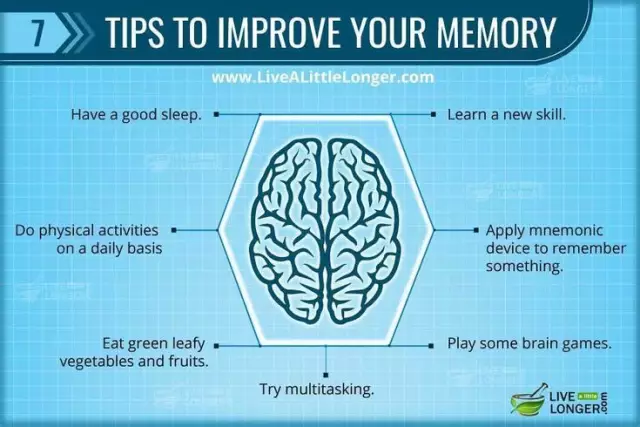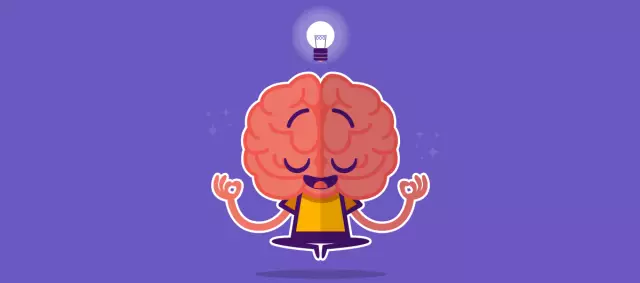- Author Rachel Wainwright wainwright@abchealthonline.com.
- Public 2023-12-15 07:39.
- Last modified 2025-11-02 20:14.
Five ways to improve your memory
Does constant forgetfulness upset you? Here are some simple ways to improve your memory significantly
Specialists
from the Lingvomed medical translation bureau took part in writing the material
Many of us are familiar with the problem of poor memory. For example, when going to the store, when we know that we need to buy three things, but we remember only two of them. Or when we go to the next room, forgetting why. Or when you need to remember important information, and it immediately flies out of my head.
There are many proven methods of memorization, some of which have been known for decades, such as mnemonics or associative memorization. But what are scientists working on today? Of course, some more research is needed to determine the best techniques. But what do we know at the moment?

1) Move back
Most of us think that time and space are two completely different things. However, they are closely related. We leave past events "behind us." And we look forward to the future. Of course, in different cultures, these ideas may differ, but in Western countries, many people perceive the future precisely as something that is located in space in front, and the past as something that is behind.
Scientists decided to use this connection in our minds between time and space in order to find a way to help us remember events better.
A study was conducted in which the subjects were shown a list of words, a set of pictures, or a staged video about the theft of a woman's purse, after which the participants in the experiment had to walk 10 m across the room either forward or backward to the sound of a ticking metronome. Upon further examination of the quality of memorizing words, pictures or videos, it turned out that in each case those who moved back remembered more.
As if moving back in space helped them mentally go back in time and as a result gain easier access to the information stored in their memory.
This pattern was also observed when the subjects only imagined that they were moving backward without doing it physically.
This study shows that when a person recalls a past event, he mentally reconstructs what happened in the reverse order. When we first see an object, we first notice its shape and color, and only then do we realize what kind of object it is. When we try to remember an object, everything happens in reverse order: first we remember the object itself and only then, if we are lucky, its features.
2) Make a drawing
Maybe you should draw a shopping list instead of writing them down? In 2018, subjects, divided by age into groups of young and old, were asked to memorize a list of words. When memorizing, one half of the group had to draw each of the words, and the other half just wrote them down. Then it was checked how many words each group remembered. Even though some words, like "isotope", were quite difficult to depict, the drawing process allowed the elderly to perform as well as the young. Drawing has helped even people with mental disorders.
When we draw something, we involuntarily pay more attention to detail, and it is this process of deeper processing of information that makes us more likely to remember something. Even making a list of words helps a little. For example, walking into a store and realizing that the shopping list was left at home, you can still remember much more than if you had not made it at all. Drawing helps with this even better.
3) Exercise, but timing is right
It is a well-known fact that aerobic exercise like running can improve memory. Regular exercise has little overall effect, but when you need to remember something specific, one set of exercise, at least for a short time, can help.
Research shows that if we choose the right time to exercise, our memorization results can be even better. Subjects who performed a 35-minute interval training session four hours after memorizing a set of pictures, grouped in pairs, performed better when playing pairs than those who started training immediately after memorizing.
In the future, scientists plan to pinpoint when exercise is most beneficial. This time may differ depending on what you want to remember.
4) do nothing
When people with stroke amnesia were asked to memorize 15 words and then given another task 10 minutes later, they could only remember 14% of the original word list. But if, instead of another task, they were in a darkened room for 15 minutes without doing anything, their result was an impressive 49%.

5) take a nap
If walking backwards, drawing, exercising, or even taking a break from work seems too difficult for you, how do you look at taking a little nap? Sleep is believed to help strengthen memorization through scrolling or retrieving information that has just been acquired. And you don't have to sleep at night. Research by German scientists showed that when subjects were asked to memorize pairs of words, they were able to reproduce more of them after an hour and a half of sleep than after watching a movie.
However, the most recent research in this area suggests that this method only works for people who are used to regularly sleeping during the day. If you are not one of them, it is worth trying techniques for backward movement, painting, exercise, or just doing nothing.
This article was prepared with the help of
medical translation from English
Found a mistake in the text? Select it and press Ctrl + Enter.






